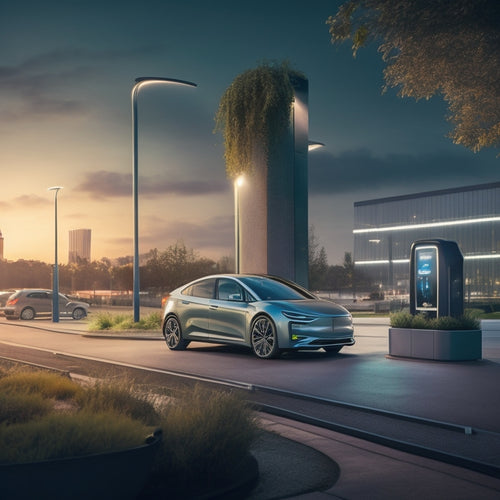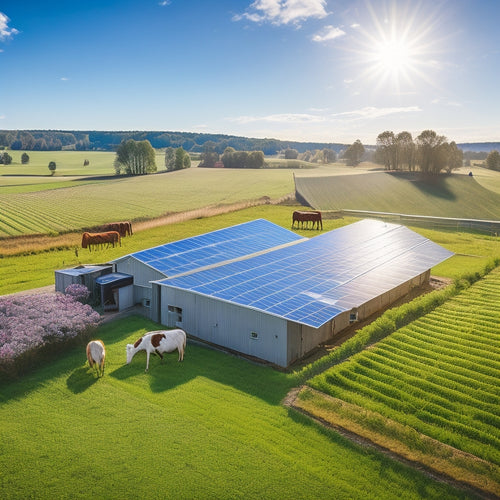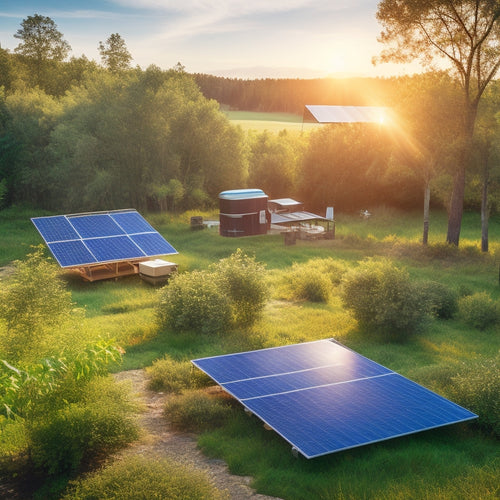
High-Powered Power Generators for Large Homes and Events
Share
High-powered power generators are vital for large homes and events, ensuring a consistent energy supply. They effectively power important equipment, maintaining uninterrupted operations and enhancing the experience for participants. When selecting a generator, consider power output, fuel efficiency, and compatibility with your equipment. Diesel options tend to offer superior fuel economy, while propane provides cleaner combustion. It's important to assess total wattage requirements to avoid overloads. Investing in high-capacity generators not only safeguards your power needs but also promotes long-term cost savings. Understanding these key aspects helps you make informed decisions for energy management. You'll find more information on optimizing your selection.
At a Glance
- High-powered generators provide a reliable energy supply, preventing outages and ensuring a smooth experience for large events and homes.
- Compatibility with various equipment types is essential; evaluate total power requirements to avoid overloads during events.
- Fuel efficiency ratings play a vital role, with diesel typically offering superior economy compared to gasoline or propane options.
- Energy-efficient generators reduce operational costs and enhance sustainability, making them a cost-effective investment for long-term use.
- Understanding specifications, such as power output capacity and noise levels, is crucial for selecting the right generator for specific needs.
Reliable Energy for Events
When planning an event, you need a consistent power supply to guarantee all equipment operates seamlessly. High-powered generators can provide reliable energy, eliminating the risks of outages that could disrupt your activities.
Moreover, these generators are designed for compatibility with various event equipment, assuring smooth functionality throughout your event.
In addition, utilizing clean energy solutions like solar power generators can enhance your event's sustainability while meeting your energy demands effectively.
With the ability to operate with zero emissions, they promote environmental health without sacrificing performance.
Consistent Power Supply
In any event, guaranteeing a consistent power supply is essential for maintaining operations and enhancing the experience of attendees. You need power reliability to avoid interruptions that could disrupt the flow of your event. A high-powered generator can provide the energy stability necessary to support everything from lighting to sound systems.
Consider the following features when selecting a generator for your event:
| Feature | Importance | Benefit |
|---|---|---|
| Power Output | Supports equipment load | Prevents outages |
| Fuel Type | Affects runtime | Efficiency |
| Noise Level | Impacts attendee comfort | Enhances experience |
Having a generator that meets these criteria guarantees that your event runs smoothly. The right generator not only offers a consistent power supply but also allows you the freedom to focus on the event itself rather than worrying about potential power failures. Additionally, investing in high-powered generators promotes long-term energy solutions, letting you utilize the full potential of your gatherings without compromise. By prioritizing power reliability, you safeguard the success of your event.
Event Equipment Compatibility
Ensuring event equipment compatibility with your power generator is vital for optimizing performance and preventing operational hiccups.
You'll need to evaluate the generator types that best match your event logistics. Different equipment—like lighting, audio systems, and catering units—often has specific voltage and wattage requirements.
Start by calculating the total power needs of your equipment. This will guide you in selecting a generator with adequate capacity, ensuring you won't encounter overloads or outages.
For instance, if you're using high-demand devices like stage lights or large sound systems, you should opt for a higher-capacity generator, such as a diesel or inverter type, which offers better efficiency and quieter operation.
Next, check the output connections. Many event devices use different plug types, so compatibility is imperative. Adapters may be necessary, but relying on them can introduce risks. Always prioritize direct connections whenever possible.
Lastly, remember to test your setup before the event. This proactive approach helps you identify any issues with compatibility or insufficient power supply, ensuring a seamless experience for your attendees.
Cost-Effective Energy Solutions
When considering cost-effective energy solutions, you'll find that energy efficiency plays an essential role in reducing operational expenses.
By investing in high-powered generators with advanced efficiency features, you can implement a long-term savings strategy that greatly lowers energy costs.
Additionally, incorporating a solar power grid can reduce utility costs by 50% to 100% and promote environmental health through sustainable energy solutions notable energy savings.
This approach not only maximizes performance but also enhances your overall financial sustainability.
Energy Efficiency Benefits
High-powered power generators stand at the forefront of energy efficiency, providing significant cost-effective solutions for both residential and commercial users. By integrating advanced technology, these generators optimize energy production while minimizing waste, enabling you to adopt sustainable practices and enhance energy conservation in your daily operations.
| Feature | Benefits | Impact on Costs |
|---|---|---|
| Fuel Efficiency | Reduces fuel consumption | Lowers operational expenses |
| Load Management | Adjusts output based on demand | Prevents unnecessary energy waste |
| Emission Controls | Minimizes environmental impact | May qualify for tax incentives |
| Smart Technology | Allows remote monitoring and control | Improves maintenance efficiency |
With these generators, you're not just investing in power; you're securing a reliable energy source that aligns with your values of freedom and sustainability. You gain the ability to produce energy when and where you need it, enhancing your autonomy while actively contributing to energy conservation efforts. This approach not only strengthens your lifestyle but also supports a more sustainable future, ensuring that you can enjoy the benefits of modern energy solutions without compromising your principles.
Long-Term Savings Strategy
How can a long-term savings strategy improve your energy expenditures? By adopting a cost-effective approach, you can greatly reduce your energy costs while maximizing the benefits of high-powered power generators. This strategy involves making long-term investments in energy-efficient technologies and systems that yield considerable savings over time.
When you engage in thorough financial planning, you prioritize investments that pay off in the long run. For instance, opting for a high-capacity generator not only guarantees reliability during outages but also lowers your operational costs through efficient fuel use. These generators often come with advanced features that optimize performance, making them a wise choice for both residential and event-based energy needs.
Moreover, integrating renewable energy solutions, like solar panels, can complement your generator system, further decreasing dependence on traditional energy sources. This collaboration not only improves your energy independence but also aligns with a sustainable lifestyle.
Key Specifications Overview
When evaluating high-powered generators, you'll want to focus on two critical specifications: power output capacity and fuel efficiency ratings. Understanding these metrics will help you determine the generator's performance and operational cost-effectiveness.
Additionally, considering the integration of renewable energy systems, such as solar panels and high-capacity deep cycle batteries, can further enhance energy management and sustainability.
Power Output Capacity
Power output capacity is an essential specification that often determines the suitability of a generator for specific applications. When you're evaluating a generator, you need to take into account how its power type—whether it's diesel, natural gas, or propane—aligns with your energy requirements. Each power type offers distinct advantages, affecting both performance and operational flexibility.
In conducting an output comparison, focus on the generator's wattage ratings, which indicate the maximum load it can handle. Look for both continuous output and surge capacity; the latter is important for starting high-demand appliances. For example, a generator with a continuous output of 10,000 watts might only have a surge capacity of 12,000 watts, which can limit its effectiveness for certain applications.
Moreover, take into account how the power output capacity can accommodate future needs, particularly for large homes or events where energy demands might fluctuate. Understanding these specifications guarantees that you choose a generator capable of supporting your lifestyle or event without compromise.
Ultimately, it's about utilizing the freedom that reliable power provides.
Fuel Efficiency Ratings
Understanding fuel efficiency ratings is essential for optimizing generator performance and operating costs. When selecting a high-powered generator, you'll want to examine how different fuel types—such as gasoline, propane, and diesel—impact efficiency. Each fuel type offers unique characteristics that can greatly influence your operational costs and runtime.
Efficiency comparison across these fuel types reveals that diesel generators typically deliver superior fuel economy, translating to longer run times per gallon. Gasoline generators, while often less efficient, are generally more accessible and easier to refuel.
Propane stands out for its cleaner combustion, contributing to less engine wear and a lower environmental impact.
To make the most informed decision, assess the generator's fuel consumption rated in gallons or liters per hour at a given load. This metric allows you to project costs based on your anticipated usage patterns.
Additionally, consider the generator's load management capabilities, as a well-designed system can optimize fuel usage, enhancing overall efficiency.
Selecting Based on Power Output
When selecting a power generator, you need to determine your specific energy requirements first.
Once you've established your needs, evaluate the generator's ratings to guarantee it aligns with your demands.
This process will help you choose a generator that delivers peak performance for your application.
Determine Your Needs
Selecting the right power generator hinges on accurately evaluating your specific energy requirements. Start by identifying the appliances and equipment you plan to power. This includes not only essential items like refrigerators and heating systems but also extras like entertainment systems or outdoor tools.
Each item has a specific wattage, which you'll need to total for a total wattage requirement.
Next, consider generator types. Portable generators are versatile and suitable for smaller needs, while standby generators offer a reliable power source for larger homes or events. Understanding these options will help in your power management decisions.
You must also account for starting wattage versus running wattage. Some devices require a surge of power to start, which might affect your generator choice.
Evaluate Generator Ratings
Regularly evaluating generator ratings is vital for making an informed decision about which unit best meets your power output needs.
You'll want to focus on the generator types available, as they directly influence power efficiency and overall performance. Look for generators that provide clear specifications, including wattage—both starting and running. Starting wattage is essential for appliances requiring a surge of power, while running wattage indicates the continuous output the generator can sustain.
Consider the Total Harmonic Distortion (THD) rating as well. Lower THD ratings mean cleaner power delivery, which is significant for sensitive electronics.
Additionally, pay attention to fuel type and consumption rates; efficient generators can save you money in the long run.
Evaluate the noise level as well, especially if you plan to use the generator in residential areas or during events. A quieter model not only improves your comfort but also enhances your freedom to enjoy your space without disturbances.
Ultimately, by carefully evaluating these ratings and specifications, you'll guarantee you select a generator that meets your specific needs while maximizing power efficiency.
Superior Fuel Efficiency
When evaluating power generators, superior fuel efficiency greatly impacts your operational costs.
By choosing models with advanced fuel management technologies, you can optimize energy consumption while reducing expenses.
This approach not only enhances your bottom line but also contributes to a more sustainable energy solution.
Cost-Effective Energy Solutions
Maximizing fuel efficiency in power generation not only reduces operational costs but also enhances sustainability. By adopting cost-effective energy solutions, you can capitalize on superior fuel efficiency while minimizing your carbon footprint.
Integrating renewable energy sources, such as solar power, into your energy mix can greatly improve the overall effectiveness of your power generation system. When you incorporate solar integration, you're not just relying on traditional fuels; you're diversifying your energy portfolio.
This strategy allows your power generator to operate more efficiently, especially during peak sunlight hours. As a result, you'll spend less on fuel and reduce reliance on non-renewable resources, aligning with your desire for greater energy independence.
Additionally, advanced generators equipped with smart technology can optimize fuel consumption, ensuring that your energy output matches demand without excess waste. This energetic adaptability means you can scale your energy production while keeping costs low.
Incorporating these strategies will enable you to utilize the full potential of your power generation system, providing both economic and environmental benefits. By embracing these innovations, you're not just saving money—you're investing in a sustainable future.
Frequently Asked Questions
How Long Can a High-Powered Generator Run Continuously?
A high-powered generator's continuous runtime depends on its fuel capacity and runtime efficiency. Typically, you can expect anywhere from a few hours to several days, depending on load and operational conditions. Always check specifications for accuracy.
What Maintenance Is Required for Power Generators?
For ideal generator performance, you should regularly check fuel types, change oil, clean filters, and perform performance testing. These maintenance tasks guarantee reliability and efficiency, helping you utilize the freedom of uninterrupted power when needed.
Are There Noise Regulations for Using Generators?
Did you know over 30% of noise complaints stem from generator noise? You'll need to check local residential guidelines, as many areas enforce regulations on permissible sound levels to guarantee you can enjoy your freedom without disturbing others.
Can Generators Be Used Indoors or in Enclosed Spaces?
You can't use generators indoors or in enclosed spaces without proper indoor ventilation. They produce carbon monoxide, a deadly gas. Always prioritize safety and guarantee adequate airflow when operating generators to prevent hazardous situations.
What Safety Features Should I Look for in a Generator?
When choosing a generator, prioritize safety features like overload protection and fuel efficiency indicators. These guarantee you won't face generator overload, allowing you to enjoy reliable power without compromising safety or performance.
Explore More
To sum up, choosing high-powered generators for large homes and events is like selecting the right engine for a powerful vehicle; it guarantees you reach your destination without a hitch. By considering reliability, cost-effectiveness, power output, and fuel efficiency, you can make an informed decision that meets your energy needs. Investing in the right generator not only enhances your event but also assures a steady flow of power, allowing you to focus on what truly matters.
Related Posts
-

Solid State Batteries in Electric Vehicles
Solid-state batteries revolutionize electric vehicles by offering a longer lifespan and higher energy density than tr...
-

What Do I Need to Know About Farm Solar Panels
When considering farm solar panels, you need to assess costs, benefits, and technical specifics. Initial investment c...
-

Top Off Grid Solar Batteries for Renewable Energy
When seeking top off-grid solar batteries for renewable energy, consider options with advanced battery chemistry, suc...


